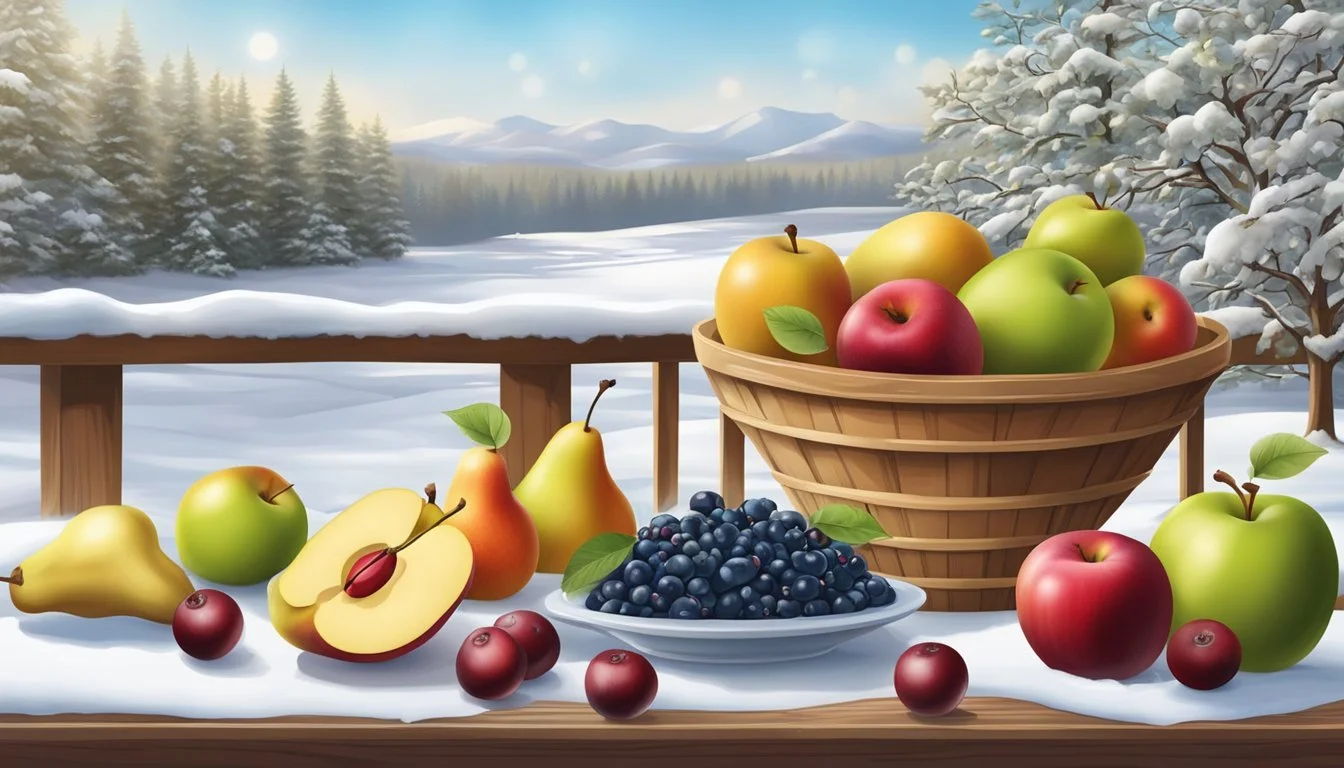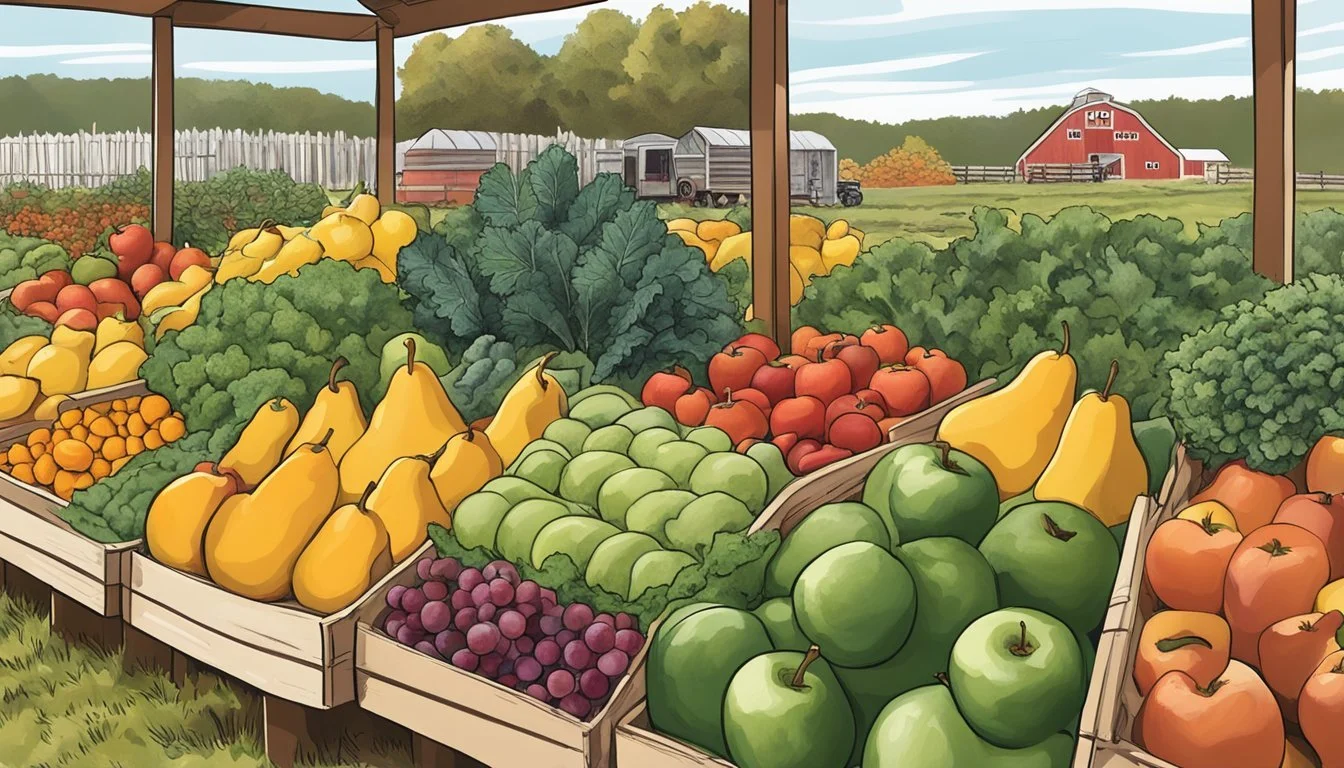Rhode Island Seasonal Fruit & Vegetables in January
A Guide to Winter Produce Selection
This Article is Part of our Rhode Island Seasonal Fruit & Veg Calendar
As the new year begins, the focus on fresh and seasonal produce continues to be a key aspect of healthy eating in Rhode Island. January, being in the heart of winter, presents a unique selection of fruits and vegetables that are in season, which are not just flavorful but also packed with nutrients suited for the colder months.
In Rhode Island's winter season, although the variety of fresh produce might seem limited, consumers still have access to a robust selection of seasonal offerings. The state's farms and local markets provide an array of produce that thrives in the colder temperatures, from root vegetables to hearty greens, and even some fruit options that are harvested in late fall and can be stored through the season.
This focus on seasonal consumption ensures residents are getting the freshest food possible while supporting the local economy. Rhode Island's January produce is marked by the season's natural growing capabilities, ensuring that even during the coldest month, the state’s inhabitants can enjoy fresh, locally sourced fruits and vegetables with minimal environmental impact from long-distance transportation.
Overview of Rhode Island's Seasonal Produce
In January, Rhode Island's local produce offerings are influenced by its wintery climate, yielding a specific set of seasonal fruits and vegetables that thrive in cooler temperatures. The consumption of these seasonal items offers benefits in taste, nutritional value, and cost-efficiency.
Seasonal Calendar and Harvest Times
In Rhode Island, January falls within the winter season, and the produce available is a reflection of the hearty crops that can endure the cold. The harvest calendar during this time includes items such as:
Winter Squash
Root Vegetables (e.g., carrots, parsnips, turnips)
Apples (stored from fall harvest)
Leafy Greens (e.g., kale)
Potatoes
Regarding fruit, apple varieties stored from the autumn harvest continue to be available, while fresh berries and stone fruits are absent until summer.
Benefits of Eating Seasonally
Consuming seasonal produce provides several benefits. Freshness is significantly enhanced, and as a result, taste and nutritional value tend to be superior when produce is consumed in season. Additionally, when consumers choose local, seasonal produce, it often results in a lower cost due to reduced transportation and storage needs.
Climate and Weather Influences
The local climate of Rhode Island is characterized by cold winters, which greatly affects the growing season. The winter climate, with its frosty weather, dictates that only certain crops can grow during January. Those that do grow are well-adapted to the cold and often become sweeter and more robust as they contend with the chilly weather. For instance, kale becomes notably sweeter after a frost.
Fruits Available in January
In Rhode Island, January is a time when certain fruits are at their peak, offering fresh and ripe options despite the winter season. Here's a look at what's available.
Citrus Fruits
Citrus fruits thrive during the colder months, presenting a peak in ripeness and flavor during January. Consumers can expect to find a variety of these tangy and juicy fruits.
Oranges: A classic winter fruit, known for its sweet and zesty flavor.
Grapefruits: Large and slightly tart, grapefruits are a refreshing citrus option.
Lemons: Essential for their juice and zest, lemons remain a staple.
Limes: Smaller and sharper in taste, limes are also available.
Traditional Winter Fruits
While many fruits are out of season, a select few traditional fruits can still be found fresh during January.
Apples: Varieties like Fuji or Granny Smith can be found crisp and ready for consumption.
Pears: With a sweet and buttery texture, pears such as Anjou or Bosc are in season.
Exotic and Greenhouse Grown
Advancements in agricultural practices have made it possible for Rhode Islanders to enjoy a variety of fruits typically not in season during January.
Strawberries: Grown in greenhouses, they are available but might not have the same sweetness as field-ripened berries.
Tomatoes: Technically a fruit, greenhouse-grown tomatoes can be found fresh in the local markets.
Vegetables in Season
January offers a diverse palette of fresh, local vegetables in Rhode Island. During this winter month, you can find a variety of nutrient-dense produce that thrives in the colder climate.
Root Vegetables
Root vegetables are a staple in the winter season, with many types reaching peak ripeness. Beets, carrots, parsnips, and rutabaga are readily available. They are known for their long shelf life and versatility in cooking.
Beets: Earthy flavor suitable for roasting and salads.
Carrots: Sweet and crunchy, perfect for both raw and cooked dishes.
Parsnips: Slightly sweet, excellent when roasted or in soups.
Rutabaga: Ideal for mashing or as a potato substitute.
Leafy Greens and Cruciferous Vegetables
Despite the cold weather, leafy greens flourish, offering a burst of color and nutrition. Cruciferous vegetables such as broccoli (how long does broccoli last?), cabbage, cauliflower, and Brussels sprouts are abundant and ideal for hearty winter meals.
Kale: Hardy and rich in nutrients; great in salads or sautéed.
Spinach: Versatile for many dishes; high in iron and vitamins.
Collards: Suitable for long cooking; pairs well with smoky flavors.
Cabbage: Perfect for slaws or fermented dishes like sauerkraut (how long does sauerkraut last?).
Broccoli: Best steamed or stir-fried; full of fiber and vitamins.
Brussels Sprouts: Delicious roasted or pan-fried with seasoning.
Squash and Gourds
Winter squash, including butternut squash and other varieties, are in their prime, providing a sweet, nutty flavor ideal for soups, roasts, and purees.
Butternut Squash: Smooth and creamy texture; roasts well.
Winter Squash: Diverse in type with rich flavors suitable for various recipes.
Other Winter Vegetables
Mushrooms, leeks, and celery root appear in markets, offering earthiness and depth to winter dishes.
Mushrooms: Umami-packed and great in stews or as a meat substitute.
Leeks: Mild onion flavor, excellent in pies and soups.
Celery Root: Also known as celeriac; a unique flavor that pairs well with meats or in purees.
Alliums
Alliums like onion, garlic, and leeks are available and are fundamental for adding flavor foundations to a multitude of recipes.
Onions: The base for stocks, soups, and stews.
Garlic: A robust flavor enhancer for any savory dish.
Leeks: A subtle hint of onion taste, ideal in potato leek soup.
Legumes
While not as prolific as other categories, hardy legumes such as peas withstand the season. They can be fresh or dried and are excellent sources of protein and fiber.
Peas: Fresh peas are sweet and can be enjoyed raw or cooked.
Seasonal Recipes and Cooking Tips
January in Rhode Island presents an excellent opportunity for cooking with seasonal produce, despite the colder temperatures. The selection of fresh vegetables, like root vegetables, and hearty greens, offers a foundation for warm, satisfying dishes.
Hearty Winter Dishes
Winter is the season for warm, comforting food. Stews and soups are particularly popular, as they are an excellent way to combine a variety of seasonal vegetables such as squash, cabbage, kale, and root vegetables like carrots and potatoes into a single dish. Root vegetables offer a sweet, earthy flavor that deepens when roasted or simmered. A simple winter stew can start with sautéing onions and garlic, followed by adding cubed root vegetables, a splash of vegetable broth (how long does vegetable broth last?), and seasonings before letting it simmer until everything is tender.
Preserving the Harvest
Preserving the taste of winter's bounty allows these flavors to be enjoyed throughout the year. Canning and freezing are effective methods for storing fruits and vegetables. For instance, broccoli and kale can be blanched and frozen, maintaining much of their nutritional value and taste. Root vegetables have a natural longevity and can be stored in a cool, dark place to extend their freshness.
Cooking with Winter Vegetables
Cooking with winter vegetables doesn't have to be dull. These ingredients are versatile and can be roasted, boiled, steamed, or sautéed to bring out different flavors and textures. Roasting squash or root vegetables caramelizes their natural sugars, enhancing their taste. Braising kale or cabbage unlocks a sweeter flavor profile in contrast to the bitter taste they can have when raw. They can also be incorporated into casseroles or baked dishes for a heartier meal that suits the cold January weather.
Supporting Local Agriculture
In Rhode Island, supporting local agriculture is integral to the state's economy and environment. Through farmers markets and CSA programs, consumers have access to fresh, seasonal produce while sustaining the local farm community.
Farmers Markets and Direct Sales
Farmers markets are a lifeline for Rhode Island's agricultural community, creating a direct channel for farmers to sell their fresh produce. These markets not only bolster the local economy, but they also provide a space for consumers to buy seasonal fruits and vegetables straight from the source. By purchasing directly from farmers at these markets, consumers help maintain the vitality of Rhode Island farms and ensure the continuity of local food traditions.
Location: Various towns and cities across Rhode Island
Items: A variety of fruits and vegetables, dependent on season
Benefits: Supports local farms, boosts the state economy, provides access to fresh food
Community Supported Agriculture (CSA)
Community Supported Agriculture, commonly referred to as CSA, is a subscription-based model that connects individuals directly to their local farm. Participants often receive a share of seasonal and fresh produce throughout the farming season. This model provides Rhode Island farmers with a consistent market and financial support, while community members enjoy the harvest of locally-grown products.
Commitment: Seasonal subscription to a farm's produce
Produce: Varied selection based on harvest availability
Impact: Strengthens community-farm ties, promotes sustainable agriculture practices
By engaging with farmers markets and CSAs, Rhode Islanders play a crucial role in maintaining the state's rich agricultural landscape. Through these efforts, they support farms, foster a sense of community, and have access to some of the freshest produce available.







